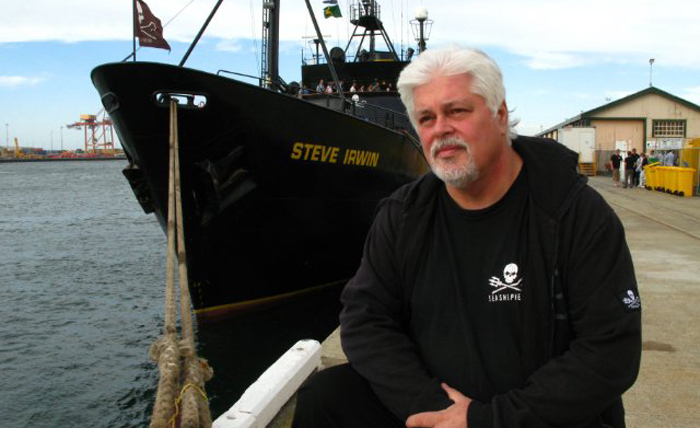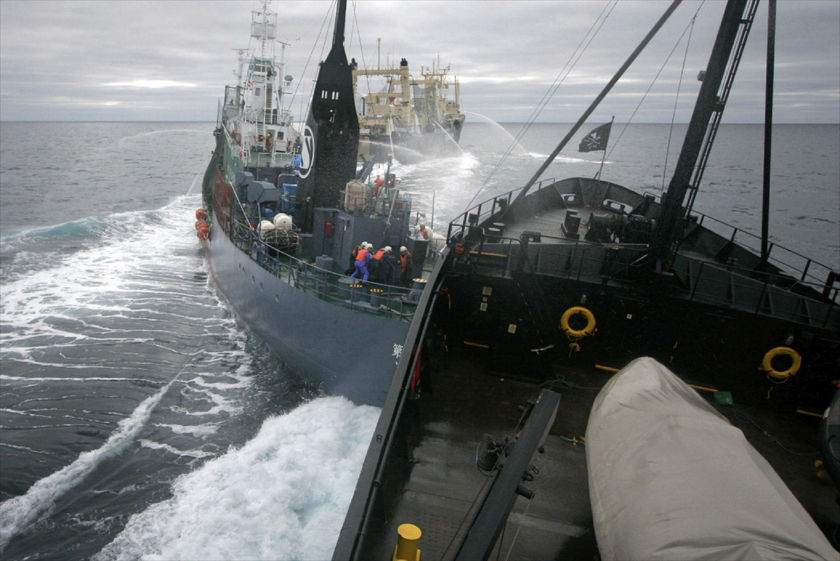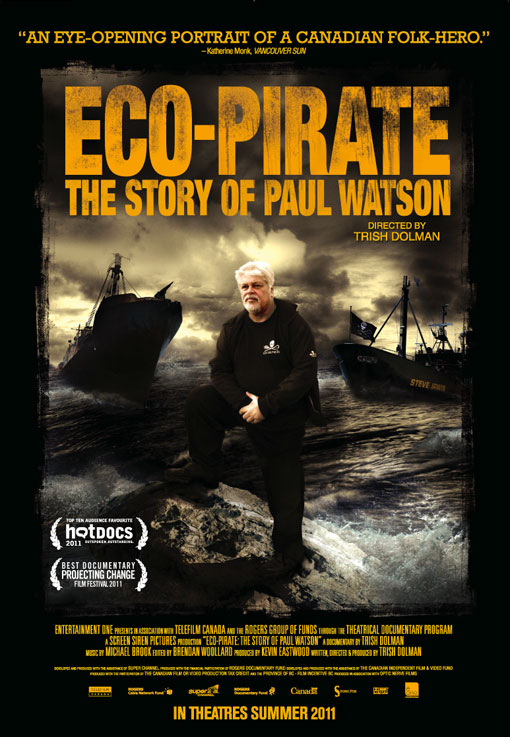REVIEW - Eco-Pirate: The Story of Paul Watson
A few days ago, I attended a screening of the documentary Eco-Pirate: The Story of Paul Watson at the TIFF Bell Lightbox in downtown Toronto. The film follows the controversial (some would say extremist) Canadian environmentalist Captain Paul Watson, the president of the Sea Shepherd Conservation Society.
Watson has achieved worldwide notoriety for his radical anti-whaling, anti-sealing and anti-fishing activities, which often include ramming and sabotaging ships that work in industries Watson opposes. Intriguingly, the film attempts to explain Watson’s actions, and as a result might be fairly polarizing for viewers. Read on for my full review, including my ranking out of four stars!
One thing becomes clear early on in Eco-Pirate: the film is unabashedly in support of its subject. The doc does not state outright that Paul Watson is a hero, but in its avoidance of the other side of the anti-whaling argument, it clearly understands his point of view. It implies that Watson’s campaigns are dangerous, but redeemable, because of how they ultimately protect the animals. Watson is portrayed as the loveable rogue, a founding member of Greenpeace who decided to split with the pacifist organization because they do not support radical tactics like violent confrontations or sabotage. Once the film’s position becomes clear, it’s up to the viewer to decide how they want to take it.
The doc was directed by Canadian filmmaker Trish Dolman, the product of several years of filming aboard Watson’s voyages and a wide range of interviews with Watson and people who know him. I’m not sure where she stands in relation to Watson when it comes to environmental radicalism, but Dolman hides much of her own personal agenda by omitting any third-person narration, leaving the speaking to Watson and others.
As a result, Eco-Pirate occasionally acts like a soap box for Watson, where he argues that humans are inherently destructive creatures, and claims that he values his connection with animals far more than any human relationship (Watson has been married and divorced three times).
The movie chronicles his early years with Greenpeace and his first experience witnessing a whaling operation. This is intercut with archival footage of whaling, including a few graphic clips of sailors using explosive harpoons to kill whales. Thankfully, Eco-Pirate doesn’t overwhelm the viewer with these images – using just enough to establish the violence and potentially heartbreaking nature of whaling.
The film is interwoven with more contemporary segments recorded during Watson’s 2005 expedition to the South Antarctic Sea, in pursuit of the Japanese whaling fleet. The fleet often makes the news through its alleged exploitation of a loophole in the International Whaling Commission moratorium on whaling, allowing them to kill whales to conduct research, later selling the meat and by-products. Watson maintains that what the Japanese are doing is flagrantly illegal, and uses his “navy” of privately-funded ships to chase the whaling fleet and attempt to stop them.
He employs a range of weapons to do this: water cannons, acid gas, blades mounted to the sides of his ship, and lengths of rope used to foul the propellers of enemy ships. Watson even sends crewmembers out in Zodiac inflatable boats to block the drainage ports on whaling ships, backing up the systems that dump the whale blood back into the ocean. The scenes of Watson attacking other ships make for the most thrilling parts of the doc, but the viewer must still decide whether to agree with his tactics: are they justifiable because they oppose unnecessary whaling, or are they acts of war by an environmental terrorist?
What I found particularly compelling about Watson weren’t his interventions in whaling and sealing, but his ideas about how to use the media to his advantage. He shows how he exploits fundamental story elements like sex, scandal, celebrity and violence to attract the press to his campaign: inviting French actress Brigitte Bardot to tour the sealing operation in Newfoundland, rubbing shoulders with celebrity financiers like Bob Barker and Martin Sheen, or ensuring that images of whaling and sealing end up on national networks. Unfortunately, Eco-Pirate (perhaps unintentionally) becomes one of these productions, working as another outlet for Watson’s skewed views, so we cannot get a full understanding of the whaling/sealing argument from this film alone.
In terms of the craftsmanship of Eco-Pirate, the doc is competently made, showing off Dolman’s skill as a shooter and interviewer. She uses a cool editing trick to transition between old photos of Greenpeace members to their contemporary appearance in interviews, applying a cross-fade between the face in the photo and the following face in the interview. She also helps the viewer keep track of interview subjects by placing a flag next to their names to associate them with their country of birth, a stylistic choice inspired by her nautical theme. The film does tend to jump around a bit in time, with flashbacks that don’t quite flow in chronological order. While this might annoy a few viewers, it doesn’t detract from the ultimate goal of the doc: to tell Paul Watson’s story, both the good and the bad.
Obviously, if you agree with Paul Watson’s aggressive strategy, you will probably enjoy this film more than someone who objects to it. Nevertheless, I would recommend the film to both camps, if only to find out what kind of an effect it has: does Eco-Pirate embolden others to join Watson’s radical conservation group, or does it only serve to vilify him further? Personally, I’d just like to see some balance in this debate – something I know will be difficult to achieve.
Eco-Pirate: The Story of Paul Watson gets three stars out of four for its comprehensive depiction of a polarizing environmentalist, but loses points for avoiding a balanced consideration of the whaling/sealing debate.
If you’ve seen Eco-Pirate, I’d love to hear from you! How did you react to the ideas in the documentary? Do you agree or disagree with Watson’s tactics? Even if you haven’t seen the movie, leave a comment below about how you feel about Watson, based on this review or what you’ve heard about him in the media. If you're so inclined, check out some of my recent reviews:






